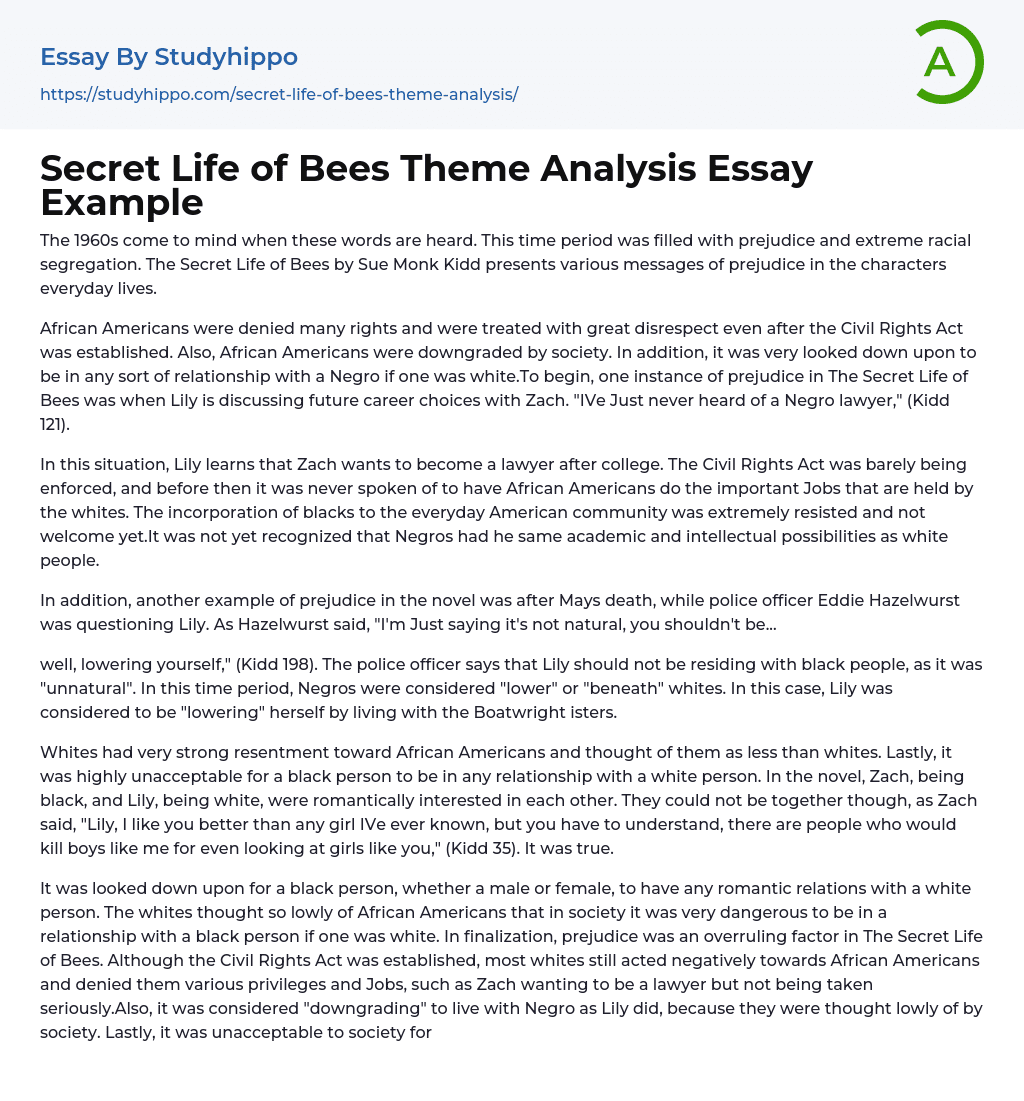The Secret Life of Bees by Sue Monk Kidd explores prejudice and extreme racial segregation during the 1960s, a time period in which these issues plagued society and impacted characters' everyday lives.
Despite the implementation of the Civil Rights Act, African Americans faced discrimination, disrespect, and societal degradation. Interracial relationships were frowned upon and even discussing career choices with African Americans was met with prejudice, as seen in The Secret Life of Bees where Lily questions the possibility of a Negro lawyer (Kidd 121).
Lily learns that Zach wants to become a lawyer after finishing college, a time when the implementation of the Civil Rights Act was limited and the concept of African Americans occupying prominent roles was unheard of. The incorporation of black people into American culture faced significant opposition and disapproval as individuals did not recognize their intellectual ab
...ilities and academic potential were on par with white individuals.
Furthermore, there was another instance of discrimination in the book when Lily was being interrogated by police officer Eddie Hazelwurst after May's death. Hazelwurst remarked, "I'm Just saying it's not natural, you shouldn't be..."
During this era, black individuals were regarded as inferior to whites and residing with them was deemed "unnatural" by a police officer who suggested that Lily refrain from living with the Boatwright sisters. Lily was consequently considered to be "lowering" herself in her association with them.
African Americans were considered inferior and strongly disliked by white people. Society did not accept romantic relationships between black and white individuals. Lily, a white character in the book, was romantically interested in Zach, who is black. However, due to societal attitudes, they could not be together. Zach expresse
this reality to Lily by stating that there were people who would harm him for simply looking at her (Kidd 35).
The Secret Life of Bees emphasizes the prevalence of prejudice in the 1960s, particularly regarding interracial relationships. Society deemed such relationships dangerous, especially for white individuals who were expected to hold African Americans in low regard. Despite the establishment of the Civil Rights Act, whites continued to deny African Americans job opportunities and privileges, as seen when Zach was not taken seriously as a potential lawyer. Living with a black person like Lily's "Negro" was also considered a degradation according to societal norms. Ultimately, the book demonstrates how heavily whites in that era were influenced by societal expectations.
It is evident that The Secret Life of Bees had a significant presence of prejudice, which remains prevalent in contemporary society and is fundamentally unjust.
- Euthanasia essays
- Assisted Suicide essays
- Censorship essays
- Gun Control essays
- Empowerment essays
- Civil Rights essays
- Capital Punishment essays
- Death Penalty essays
- Human Trafficking essays
- Sex Trafficking essays
- Gay Marriage essays
- Affirmative Action essays
- Child Labour essays
- Privacy essays
- Speech essays
- Child Protection essays
- Corporal Punishment essays
- Police Brutality essays
- Gun essays
- Death Penalty Pros And Cons essays
- Is The Death Penalty Effective essays
- The victim essays
- Public Speaking essays
- Freedom Of Speech essays
- Free Speech essays
- Persuasive Speech essays
- Gettysburg Address essays
- Informative Speech essays
- Abortion essays
- Abuse essays
- Animal Rights essays
- Animal Testing essays
- Assault essays
- Bullying essays
- Controversial Issue essays
- Crash essays
- Cyber Bullying essays
- Feminism essays
- Human Rights essays
- Immigration essays
- Inequality essays
- Poverty essays
- Prejudice essays
- Racism essays
- Torture essays
- Violence essays
- Adaptation essays
- Adventure essays
- Adversity essays
- Aging essays




